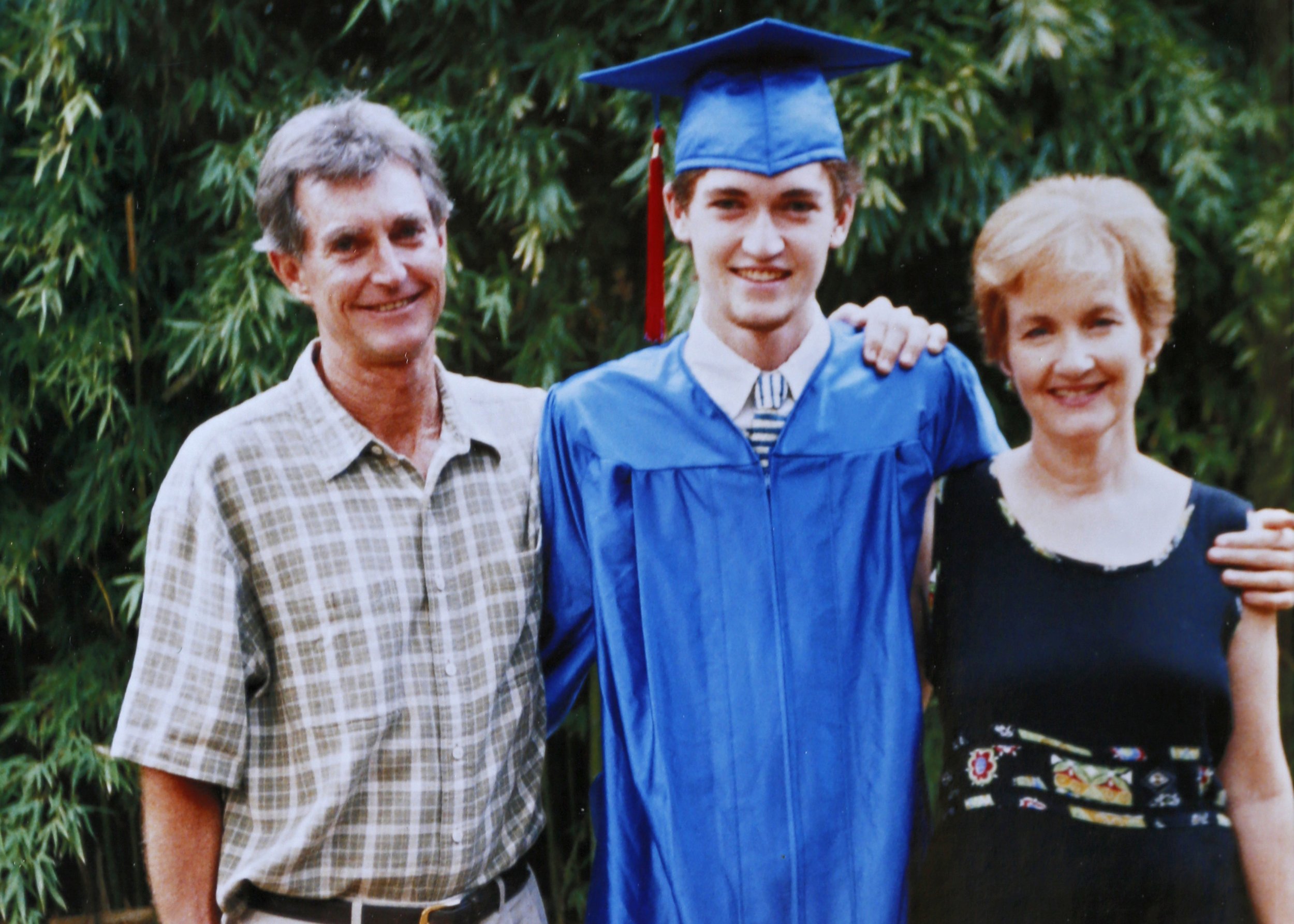Jeff Buckley’s life started with both an act of embrace and a decisive abandonment. His mother was only 17 when she conceived him and, while it was suggested she might give the baby up for adoption, she knew she had to nurture the human growing inside her and let him nurture her in return. Jeff’s father, on the other hand, could not let his dreams of being a famous singer/songwriter be replaced by the difficulties of raising a child and chose not to be a part of his life.
Tim Buckley would eventually gain the notoriety he sought, producing nine studio albums and serving as a well-known figure in the folk rock community for his unique voice and experimentation with multiple genres of music. Though Jeff did finally meet his father following a concert near where he grew up in Southern California, Tim would die of a heroin overdose shortly thereafter. For the rest of his life, Jeff would eschew comparisons to Tim, but could never shake the feeling that their paths had somehow become entwined, particularly the notion that he wouldn’t end up living very long.


In Amy Berg‘s somber and evocative tribute documentary “It’s Never Over, Jeff Buckley,” the eponymous singer/songwriter’s personal life is often given more attention than the music he left behind, a fact that would likely irritate Buckley to no end were he still alive. Unfortunately for his fans, a world bereft of more of his work, and those who loved him most, he is not, and while his music has only grown in popularity since his passing, Buckley’s memory has faded into the background.
Berg aims to change that with her piece, first by allowing those closest to him — from Buckley’s mother Mary Guibert to band member and friend Michael Tighe — an opportunity to share their recollections of what made him so special and then using Buckley’s previously unseen archives to take viewers back in time, dropping us into 1960s SoCal, the artsy lower Manhattan of the early ’90s, and various concert events around the world.
At first, Berg’s approach to piecing together Buckley’s history feels rather traditional, with direct-to-camera reflections from Guibert about his childhood and how she knew he would be a singer at a very young age, as well as pictures and clips of Buckley as he grew and his voice began to develop. After Tim comes back into the picture for a brief moment before his death, reinforcing all the sensations of unworthiness in Jeff that had present since birth, the vibe takes a noticeable shift. Focusing in on Buckley’s teenage years, the doc captures the development of not only a true artist, but a gifted performer who saw music as both a form of expression and a universal language that can reach deep into the soul. While his greatest reverence was held for the iconic rock band Led Zeppelin, his own style gathered more from untraditional influences like Nina Simone and Qawwali musician Nusrat Fateh Ali Khan.
Though anyone who’s listened to his lone studio album “Grace” even just once knows Buckley was a unique talent who’s four-octave range held both sensitivity and immense power, the talking heads throughout — many of whom are musicians themselves or in the music business — can’t help but reinforce this many times over. However, sticking to her overall intention with the film, Berg draws a line between this technical skill and Buckley’s ethereal spirit, which, having been raised by a single mother, contained both masculine and feminine features and poured love onto others with reckless abandon. Other women in his life, such as girlfriends Rebecca Moore and Joan Wasser, as well as colleague Aimee Mann, are moved to tears as they recall how he made them feel, but even they recognize that this passion could also be dangerous.
 Jeff Buckley, 1993Courtesy: Everett Collection.
Jeff Buckley, 1993Courtesy: Everett Collection.From his shattering public debut singing at a tribute concert for his father to his signing with Columbia Records after time spent developing his skills at Sin-é in Lower Manhattan, Buckley held an incredibly high standard for himself, drawing on the careers and impact of figures like Bob Dylan and Bruce Springsteen as inspiration for his own rise. Many music executives at Columbia were happy to enforce that expectation, especially after the release of “Grace,” which introduced Buckley as one of the greatest singers of all time, according to other artists like David Bowie and the film’s producer, Brad Pitt. Though the album was only a moderate success in America, it was a global hit overseas, and as Buckley and his band toured over the next few years, the pressures of fame and the boxing in of his artistry caused his mental state to slowly deteriorate.
This is where the necessity of Berg’s aim begins to become clear. Buckley may not have liked his life being put center stage ahead of his music, but so much about it has been misconstrued in an effort to compare him to other tragic artists like his father, Jim Morrison, Janis Joplin, and Jimi Hendrix, all of whom passed as a result of drug use, that the need to set the record straight and show Buckley for all his one-of-a-kind beauty and complications proves vital. And while the personal details and recordings shared often feel incredibly intimate, as if, perhaps, we shouldn’t in fact be listening to this, the added context does make us listen to his music in a new way. Every clip of Buckley performing lifts the film off the ground, highlighting how his talents often felt otherworldly. This is further accentuated by the Lynchian animation produced by Icelandic director and artist Sara Gunnarsdóttir, known for her work in Marielle Heller’s “The Diary of the Teenage Girl” and her Oscar-nominated 2022 short “My Year of Dicks.”
Once the tour wraps up, Buckley’s stress is further exacerbated by the need to produce a second album and pay back the debts he accrued in making “Grace.” As artists and musicians themselves, many of the participants speak directly to the problems within the business that set rising talent up to fail, though the executives featured also do their best to defend their positions and express how they worked to support Buckley with whatever he needed. Nonetheless, those who only cared about his well-being saw he was going through a psychotic break and as he holed himself up in a small house in Memphis, Tennessee to work on new music, many were concerned what time would yield. Thankfully though, the time away from the fuss of fame cleared his mind, allowing him to produce ideas for his band to come work on, but due to a devastating accident, this would never come to pass.
Toward the end of “It’s Never Over, Jeff Buckley,” Wasser makes a point about Buckley that helps to tie the piece all together. She says that so many of the problems we deal with when we’re younger eventually fade away as we get older and that saddest part of Buckley’s whole story is that he never got the chance to reach that point. Yes, he had elements of mania and depression that likely needed psychological intervention, but he also cared so much about connecting with humanity that those who knew him best really do believe he had more to give.
Berg has covered many tragic figures and situations before, particularly in the realm of sexual violence with films like “Deliver Us from Evil,” “An Open Secret,” and “Phoenix Rising,” and including other music docs like “Janis: Little Girl Blue,” but with her latest entry, she finds that despite what many may think, tragedy is the least interesting aspect of her subject. By keeping her focus on only a handful of people who could speak directly to Buckley’s history, she finds what’s most compelling — outside of the music, of course — was his ability to move forward and upend preconceptions at every turn. From building a legacy beyond that of his father’s to being a constant source of light to his mother and others, Buckley may have felt like he wasn’t long for this earth, but through the music he left behind, proved even himself wrong.
Grade: B+
“It’s Never Over, Jeff Buckley” premiered at the 2025 Sundance Film Festival. It is currently seeking U.S. distribution and sales are being handled by Submarine.
Want to stay up to date on IndieWire’s film reviews and critical thoughts? Subscribe here to our newly launched newsletter, In Review by David Ehrlich, in which our Chief Film Critic and Head Reviews Editor rounds up the best new reviews and streaming picks along with some exclusive musings — all only available to subscribers.




















 English (US) ·
English (US) ·